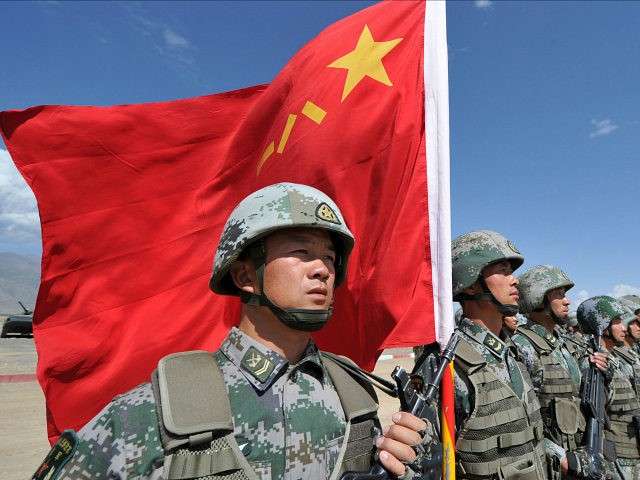China’s defense ministry on Thursday maintained that Beijing does not have a military presence in neighboring Afghanistan where Chinese Uighur jihadis are known to train and operate.
Despite Beijing’s repeated denials, the Pentagon acknowledged in 2017 that the Chinese military is operating inside Afghanistan.
War-ravaged Afghanistan borders China’s Muslim-majority Xinjiang province, home to the country’s oppressed and mistreated Uighur community and other minorities who follow Islam.
As China’s largest province, Xinjiang borders several countries, including Mongolia, Russia, Kazakhstan, Kyrgyzstan, Tajikistan, Afghanistan, Pakistan-occupied Kashmir, and India.
While denying a military presence in Afghanistan on Thursday, Ren Guoqiang, a spokesman for the Chinese defense ministry, defended Beijing’s military cooperation with Tajikistan.
“This cooperation benefits the two countries, their two militaries, and regional peace and stability,” he told reporters.
China has repeatedly denied having deployed troops into Afghanistan despite expressing concern about jihadi activity potentially spilling over into Xinjiang. Beijing has acknowledged providing military aid to Afghanistan.
The Associated Press (AP) acknowledges:
Despite the denials of Chinese military activity in the area, unconfirmed reports have shown what appear to be Chinese military vehicles operating in [Afghanistan’s Wakhan Corridor], which lies in the shadow of the Hindu Kush mountains with Tajikistan to the north and Pakistan to the south.
Troops from India and its regional rival China appear to be preparing for potential consequences from a possible U.S. military withdrawal from Afghanistan stemming from ongoing peace negotiations between the Taliban and the United States.
Gen. John Campbell, as the top commander of U.S.-NATO troops in Afghanistan, warned in 2016 that once the U.S. withdraws from Afghanistan, other regional powers, including China, may move in to fill the vacuum.
U.S. President Donald Trump has suggested his administration is considering a partial withdrawal from Afghanistan, but the Pentagon maintains that it has received no such orders.
China has expressed support for ongoing peace negotiations in Afghanistan but warned the United States against an abrupt withdrawal.
Last week, Beijing revealed that it is planning to establish a group to speed up peace negotiations.
Although China had apparently attempted to keep secret its military presence in Tajikistan the Washington Post reported in February that Beijing maintains a significant military presence in Tajikistan, which borders Afghanistan.
The Chinese spokesman did not provide any details about Beijing’s mission in Tajikistan.
Arguing that its an effort against terrorism and extremism, China has reportedly sent up to a million members of its Muslim minority to concentration camps in Xinjiang where they are allegedly tortured and abused.
U.S. officials have conceded that a military victory is not possible in Afghanistan. The Trump administration has deemed the negotiated reconciliation between Kabul and the Taliban the primary goal of its strategy to end the more than 17-year-old war in Afghanistan.

COMMENTS
Please let us know if you're having issues with commenting.